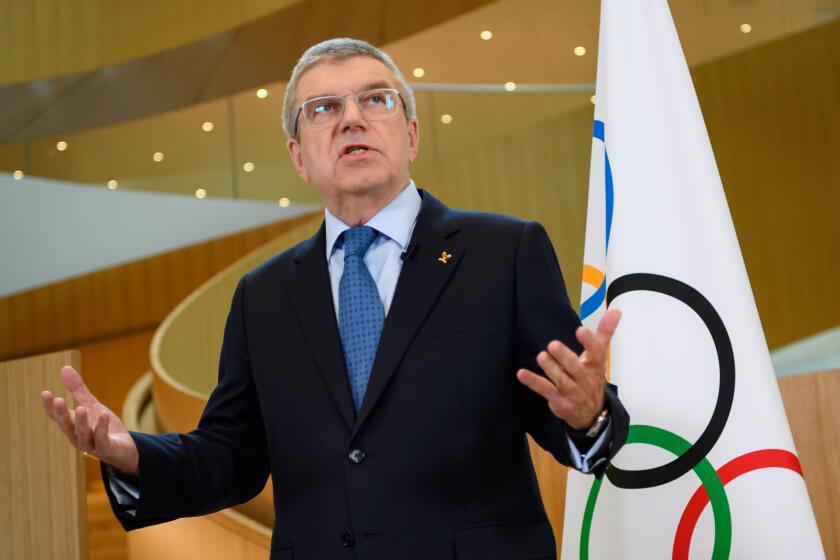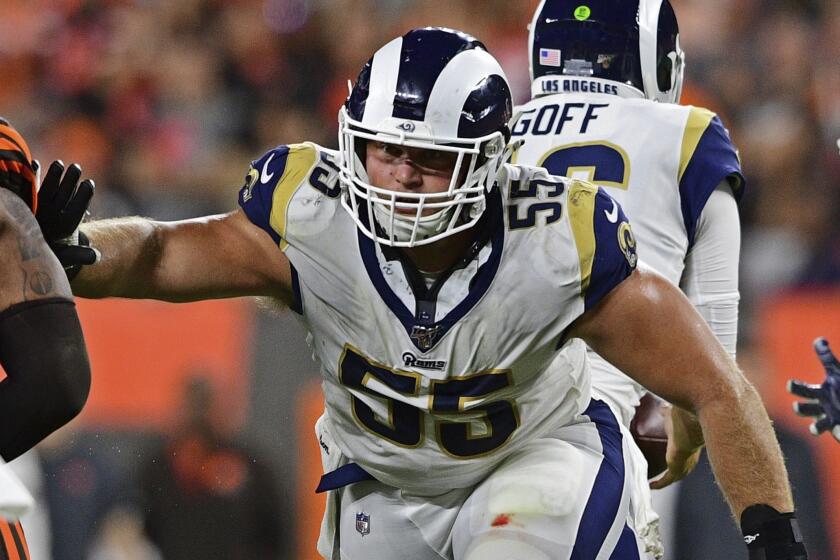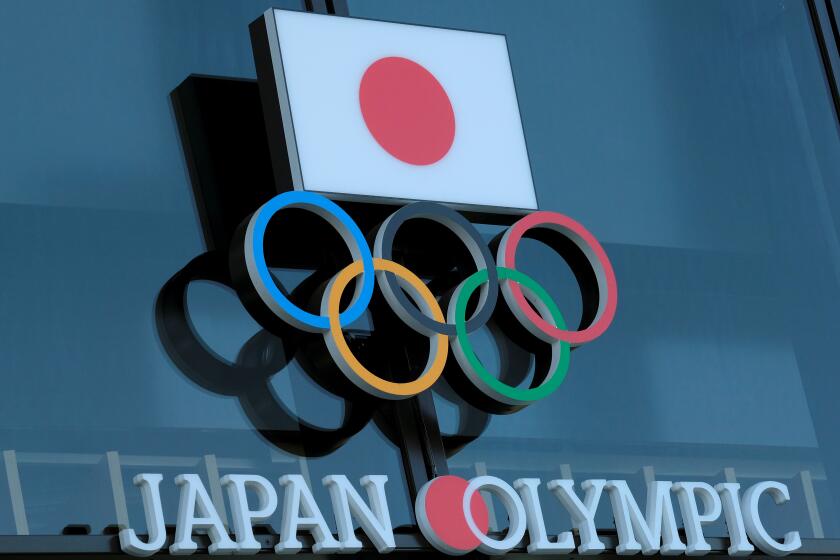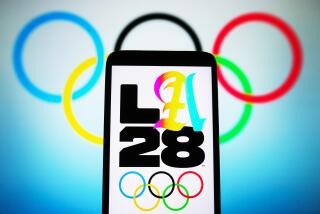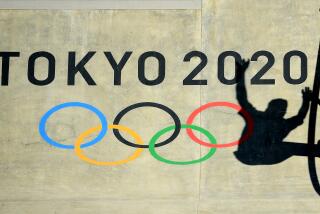Tokyo Olympics postponed because of the coronavirus outbreak

- Share via
Over the last month or so, Jake Riley tried to prepare himself mentally. As an elite marathon runner who had already qualified for the U.S. Olympic team, he knew the 2020 Summer Games in Tokyo might be postponed.
Still, when the news broke Tuesday, Riley felt a twinge.
“Intellectually, I know it was absolutely the right call,” he said from his home in Colorado. “But I was a little surprised at how hard it hit me.”
The decision to delay the Games until next year because of the coronavirus outbreak triggered an avalanche of reactions among the world’s top athletes and created what officials called a “huge and very difficult jigsaw puzzle” for everyone involved in the vast Olympic movement.
Some international federations will have to rework schedules for their sports, and television broadcasters will have to address more than $1 billion in commercial spots already sold for next summer. A Japanese economist estimates the delay could cost Tokyo organizers as much as $5.75 billion.
The International Olympic Committee, which must work with its many stakeholders to find a new date, said only that the competition and ensuing Paralympics will take place before the fall of 2021.
In the end, the International Olympic Committee had no other choice but to postponed the Olympics until 2021 because of the coronavirus outbreak.
Swimmers, gymnasts and cyclists who had pushed for a change nonetheless expressed mixed feelings — understanding and disappointment, acceptance and worry — when it came to putting their dreams on hold and facing the uncertainty of what next year might look like.
“As an athlete, you’re always pointed toward something,” said Nia Ali, a silver medalist in the 100-meter hurdles at the 2016 Olympics. “You work hard all year, getting yourself in a good place, wondering if you’ll be a gold medalist by the end of summer. That’s the tough part.”
For more than a century, the modern Olympics persevered through floods, disease and political unrest. Only the first and second World Wars forced them to step aside.
Faced with a growing drumbeat of criticism, and Canada’s refusal to send a team to Tokyo this summer, IOC President Thomas Bach and Japanese Prime Minister Shinzo Abe held a conference call Tuesday to discuss the “constantly changing environment” caused by a virus that has infected more than 417,000 people worldwide. They announced the postponement hours later.
“The unprecedented and unpredictable spread of the outbreak has seen the situation in the rest of the world deteriorating,” they said in a joint statement, adding that a delay was necessary to “safeguard the health of the athletes, everybody involved in the Olympic Games and the international community.”
Full coverage of the International Olympic Committee’s decision to postpone the 2020 Tokyo Games until 2021 because of the coronavirus outbreak.
The impact on athletes will be significant for several reasons.
At the elite level, competitors plan their training and competition schedule a year or more in advance of the Games. Some reacted to Tuesday’s news with optimism.
“I’m taking this postponement as an opportunity to spend the next year on getting better,” American swimmer Lilly King said in a statement. “My hope is that this short delay will result in an Olympics that will be the pinnacle of sport.”
British runner Zoey Clark said on social media that “the dream is still there, only the timeframe has changed.”
But timing could be problematic for athletes who must devise a new road map without knowing exactly when the Games will take place. Ali called her coach first thing.
“It’s a lot of pressure for him,” she said from Florida. “All of his athletes are coming to him for answers that he doesn’t have right now.”
There have also been questions about qualifying. Will Riley and others who have already secured a trip to the Games be guaranteed a spot next year?
“For our ranked athletes, this is the single biggest stressor,” said Phil Andrews, the chief executive of USA Weightlifting. “The fear they may have to fight again for what they have already earned.”
Many of these athletes have little in common with players from the shuttered NBA who have million-dollar contracts and must only worry about how the Games fit into their schedule. These young men and women often struggle to survive economically in less glamorous sports.
David Brown, a blind Paralympic sprinter, and his guide runner, Jerome Avery, consider themselves fortunate after learning their corporate sponsors will stick with them for another year.
“That allows us not to worry as much,” Avery said. “To pay those phone bills, the car insurance.”
A look at athletes, coaches and others in the sports world who have tested positive of the coronavirus.
Tokyo 2020 has its own money problems. It has reportedly spent $12.6 billion on preparations; other estimates have put the total closer to $25 billion.
The organizing committee is relying on a blend of permanent and temporary venues. The IOC has raised the prospect of some not being available next year, which could add to costs.
Like the IOC and broadcaster NBCUniversal, organizers are insured against cancellation or postponement, but it remains unclear how much will be covered. Since the 2003 SARS outbreak, the insurance industry has set new parameters for claims involving communicable diseases, said Kristen Jaconi, director of the risk management program at the USC Marshall School of Business.
“I will tell you, it’s a new world,” she said. “A lot of lawyers involved, a lot of insurance brokers.”
NBCUniversal will have to forge new arrangements with advertisers who have already bought 90% of available commercial time for this summer. In addition, the media conglomerate was counting on using the Games to help publicize the debut of its streaming service, Peacock.
It could take months or longer for various Olympic stakeholders to adjust deals and rework agreements. In the meantime, the international federations that represent more than 30 summer sports will have to manipulate their schedules.
Most have already secured host cities and venues for a series of world championships stretching across the spring and summer of 2021. At least some of those events will have to be canceled or rescheduled to make room for the Olympics.
World Athletics, which oversees track and field, said it has already begun discussions to shift its high-profile championships, scheduled to take place in Eugene, Ore., next year. The federation is also hoping to salvage part of its schedule as the year progresses.
“Athletics will continue to do whatever we can to preserve and create an outdoor season of one-day meetings in 2020, starting and ending later than usual, so athletes … have access to competitions in every region,” track and field officials said. “This will help the benchmark their performances and adjust their training accordingly for an Olympic Games in 2021.”
Rick Burton, a sports management professor at Syracuse University, wonders whether the scope of all these entanglements will prove too broad. He said: “My prediction is that eventually, the IOC will announce either to cancel the Games or move the Summer Games into 2022.”
The Olympic Games have been canceled three times, all because of war, but never postponed. But the coronavirus outbreak has changed that.
For athletes, the potential for another big change might be adding to what Bach called “the situation of uncertainty, which is clearly affecting their nerves.” But most if not all of those who spoke out Tuesday were trying to keep things in perspective.
“I was a little pissed off because I’ve been training my butt off and I’ve been feeling great,” said Ryan Lochte, a 12-time medalist swimmer who created a stir at the 2016 Summer Games after a run-in with Brazilian police.
“This Olympics was going to be the most important Olympics of my career because of everything that’s happened in my past,” he said. “But this whole thing is way bigger than me. It’s way bigger than the Olympians. It’s affecting the entire world right now.”
Wharton reported from Los Angeles. Correspondent Rob Gilhooly in Tokyo and staff writers Nathan Fenno and Andrew Greif in Los Angeles contributed to this story.
More to Read
Go beyond the scoreboard
Get the latest on L.A.'s teams in the daily Sports Report newsletter.
You may occasionally receive promotional content from the Los Angeles Times.

